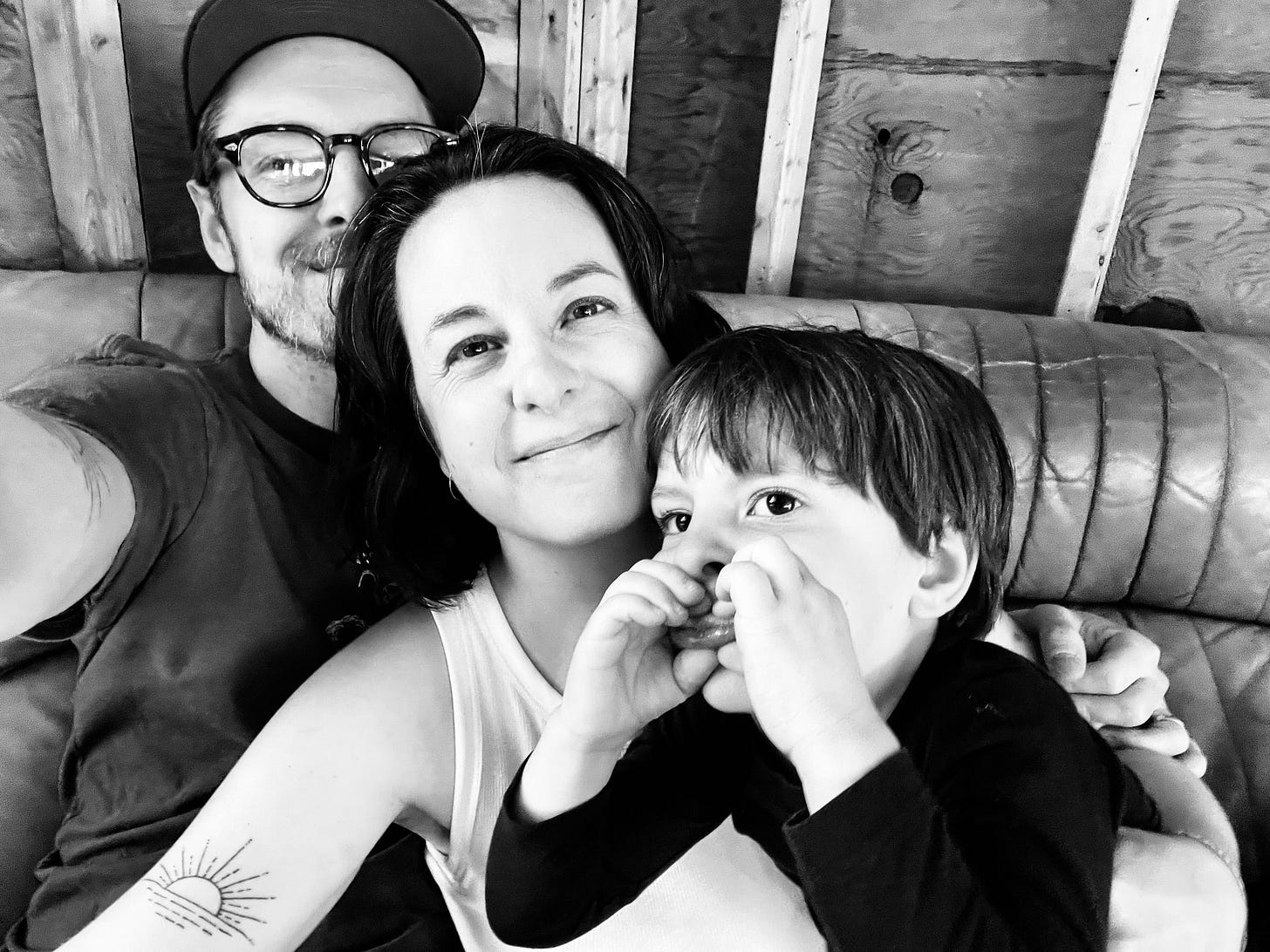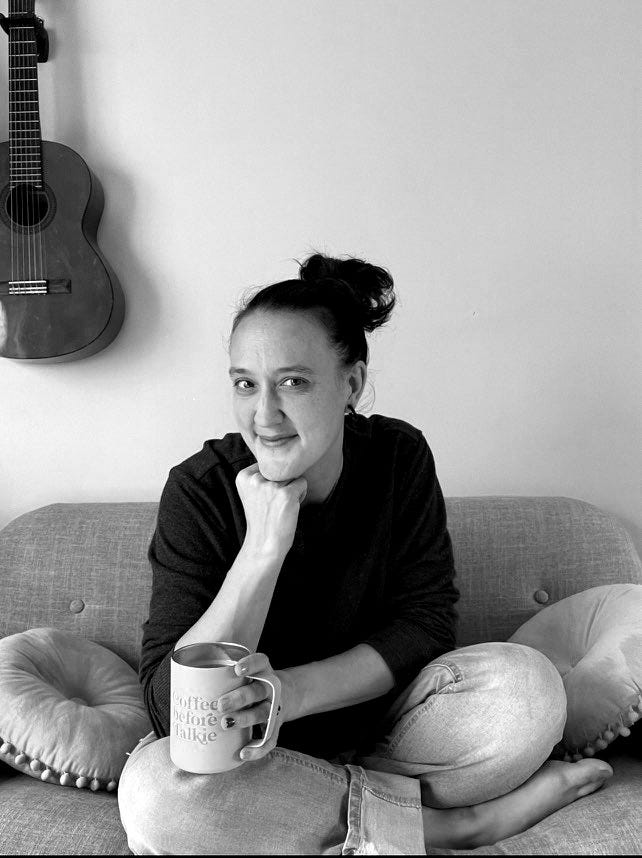Welcome! We’re so glad you’re here.
We are parents and educators who are fiercely protective of our fellow caregivers. Our dream is to see us all break free of burnout and live happier, healthier, more liberated lives.
I (Ryan) started writing on Substack because I was myself burned out, after years of doing both paid and unpaid care work in my family and community. I had spent decades doing the eldest sister/daughter thing. (If you know, you know.) I had placed the ashes of a beloved sibling into a desert creek, and those of a daughter-to-be in the soil of my garden. I had taught hundreds of children across one of the most diverse cities in the world, and then taught teachers all around the globe.
I wanted to rest, and I also wanted to tell our stories.
During that time, I met
, a fellow educator and parent, through the school our children attended at that time. Over the many playdates and coffee runs that followed, we learned that both of us are experienced facilitators, educators and parents, with a great deal of combined experience in supporting aging parents, loved ones with chronic illnesses, children with special needs, children of color, and queer folks. We both have backgrounds in leading mindfulness and writing work. And we both shared a desire to create third spaces, online and offline, where other caregivers could connect with inner clarity, connect with like-minded folks, and express their creativity and wisdom in ways that benefit not just their kids or careers, but the collective.Together, we’ve built this newsletter and community for caregivers like us. Like you.
If you sign up as either a free or paid subscriber, you can expect to receive:
Essays on care. In these essays, we write about who does it, what it is, where it is (and isn’t) happening in our communities, why that matters, and how we can build a world in which everyone participates in care, and not just a chosen (or an oppressed) few.
Interviews with contemplative caregivers. We’ve gone deep into our virtual Rolodexes to consult with all the experts we know about care. Our library of interviews includes perspectives from authors of groundbreaking books on care, perinatal health podcasters, hospital chaplains, grief group facilitators, literacy specialists, middle school history teachers, yoga teachers who specialize in supporting tired parents, therapists, NPR journalists, trans parents, devoted child-free aunties, and community organizers who know how to throw an excellent dinner party.
Practices. We regularly offer pages from our personal playbooks as meditators and writers, to help you come home to your body and connect with your intuition after a long day of tending others. If you’re looking for a place to start, try this popular grounding meditation from Ryan and/or this writing prompt from Meredith.
Resource roundups. We’re voracious readers, and we’re also very picky. We’ve created our Further Reading section so that you can access our personal reading lists, full of carefully-vetted authors and organizations who focus on topics that are important to our community, such as navigating high sensory sensitivity in yourself or a child, and moving through fresh grief.
Invitations to connect with community. Of course, you can always join us in the comments of our posts, where we delve more deeply into the topics above. We also host regular subscriber chat discussions on the Substack app in which people can join community discussions asynchronously, so whether you’re up at 3am feeding a baby or working the night shift at a hospital, you can still feel connected to other people who Get It. That said, if your schedule permits, we also warmly invite you to join our well-loved caregiver circles once a month on Zoom. During these sessions, we discuss topics of interest to our community members such as navigating new parenthood and creating neurodivergence-affirming spaces. We also practice no-fuss-no-muss mindfulness skills and other tools for tending our interior lives in real-time, with other real folks. (No levitating required.) Often, as one participant recently described it, we leave feeling “grounded and nourished.”
In other words:
"Caregivers are among the most under-served communities in our world. Ryan’s work centres those who care for others (be they parents, educators or those undertaking other forms of paid or unpaid care)… If you’re looking for increased clarity, space to tend to your inner life and to meet other caregivers who really get it, I can’t recommend Ryan’s work enough.”
—
, Life After Trauma“Ryan has some wonderful offerings to support caregivers (of all kinds), from her writing here on Substack to facilitated circles via Zoom. Her intention-based, community-oriented approach is authentic and nourishing.”
—
, The Practice of Life“I’m incredibly grateful for Ryan and the spaces she’s creating for caregivers, especially those supporting neurodivergent families. If you’re feeling tired, isolated, or would just like to be in community, I recommend her upcoming gatherings.”
—
, Radical Change“On day three, solo parenting two. A babysitter just took the kids out, I opened up Substack to find your post, and [it] was exactly what I needed to get re-grounded and not waste this time on screens still spinning in dissolution.”
You may be asking: Wait, we’re going to be talking about how self-care and mindfulness can help us fight burnout and get free? How will this be different from all the content I’ve consumed before that just tells me to calm down and/or follow a script and/or buy more stuff?
We too have consumed that stuff. Here’s what we don’t love and thus will not be sending you:
Content that includes breathy vocals or distracting New Age music in the background. You’ll often hear our kids, pets, aging parents and the occasional obnoxious leaf blower in the background, though, because we’re real people.
Content that is advertorial or influencer-y in nature. You will not find affiliate links for $70 facial serums anywhere near this newsletter (though we will sometimes recommend a good book or two from an indie bookstore that we’ve actually read and liked).
Content that suggests you should be #grateful for your domestic burdens. Especially if you’re shouldering an unjust amount. We don’t speak sanctimommy here.
Promises of “calm.” Sometimes it can be calming to talk, sit or write with other caregivers. But sometimes, it can lead to increased feelings of clarity and anger, or a wave of sadness and self-compassion crashing over you. In our experience, caregivers need more places where it’s OK feel what you’re actually feeling. Not more pressure to feel a different, better way. This, to us, is what mindfulness is actually about; everyone else, as they say in The Princess Bride, is selling you something.
Content that is vibes-based and not evidence-based. Meditation and yoga have proven benefits; so do vaccines and SSRIs.
Content that suggests in any way that you should change the shape or appearance of your body. This is a size-inclusive space; diet talk is discouraged. (You are, however, allowed to be healing your relationship to your own body and to diet culture while you’re here.)
Content that is not intersectional — that is, that does not acknowledge the stressors and obstacles faced by caregivers who experience any marginalized identity, or several overlapping ones.
If this sounds good to you, you can:
Thanks for reading!
🙏🏽 Ryan + Meredith




